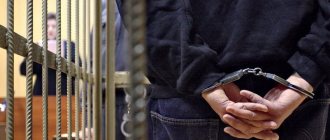Last updated - January 2022
In our society you can often hear the phrase “murder by negligence.” However, it is only relevant for American TV series and films about investigations. There it may also sound like “manslaughter.” For legal science, this phrase contains two contradictory words “murder” and “negligence”. In Russian criminal law, this is called causing death by negligence.
The current Criminal Code defines murder as intentionally causing death; it is prohibited by Art. 105 of the Criminal Code of the Russian Federation. Death caused by another form of guilt - through negligence - is included in a separate article. 109 of the Criminal Code of the Russian Federation.
In detail: Article 105 of the Criminal Code of the Russian Federation “Murder”
A criminal offense called “Careless Murder” was found in Russian law in the Criminal Code of the RSFSR of 1960 (valid until January 1, 1997 before the current code came into force), which contained article number 106 punishing such an act. The punishment for committing it was supposed to be either up to 3 years of imprisonment, or up to 2 years of correctional labor.
Composition of a criminal act
The main and necessary elements of the crime for the onset of criminal liability are reflected in the title of Article 109 of the Criminal Code of the Russian Federation.
The object of a criminal act—that which is harmed by the actions of the perpetrator—is human life.
The subject - the person who can be punished for this crime - is a sane person who has reached the age of 16 at the time of the commission.
The subjective side - the attitude of the perpetrator to the crime - is guilt in the form of negligence (Article 26 of the Criminal Code of the Russian Federation). It is the subjective side that distinguishes the act in question from murder.
Negligence can be expressed:
- In criminal frivolity - a person realizes that he is breaking some rules, admits that these actions may lead to negative consequences, while not wanting them and arrogantly hoping that they will not occur. For example, the perpetrator relies on his skill, physical strength, and other skills and abilities that will ensure the victim’s survival.
- In criminal negligence, the perpetrator does not foresee the occurrence of negative consequences as a result of his illegal actions, although with sufficient care he could or should have foreseen them.
What distinguishes this form of guilt from an accident is that a person does not foresee the occurrence of bad consequences, but at the same time could not and should not foresee them (Article 28 of the Criminal Code of the Russian Federation).
The objective side is the actions or inactions themselves, as a result of which the death of the victim is caused - it can be expressed in any actions of the perpetrator, as a result of which the death of the victim follows, with the exception of those provided for by special rules, which will be discussed below.
Vera Viktorovna Dolganina
Practicing lawyer with more than 10 years of experience.
Ask a Question
Most often, causing death by negligence is associated with failure to comply or improper compliance with any rules, standards, norms and other safety requirements, basic precautions when handling dangerous devices, mechanisms, etc.
Commentary to Art. 109 Criminal Code
1. The crime under analysis differs from murder only in the form of guilt.
2. Improper performance of professional duties by the perpetrator means the behavior of a person that does not fully or partially comply with the official requirements or instructions imposed on the person.
3. If there is a special norm providing for liability for causing death due to improper performance of professional duties by a person (for example, Part 2 of Article 143, Part 2 of Article 216 of the Criminal Code), a special norm is subject to application.
Examples
According to Art. 109 of the Criminal Code of the Russian Federation may qualify actions/inactions that resulted in the death of another person. Under certain circumstances this may be, for example, the following cases:
- the owner released the dogs in the forest or city park early in the morning, assuming that no one was nearby, as a result of which the dog attacked the person, and he died from the injuries received;
- death during a hunt due to improper behavior or placement of participants;
- improper use of firearms;
- delivering blows that did not cause harm, as a result of which the victim fell and received an injury incompatible with life, such as a traumatic brain injury;
- actions/inaction of parents - for example, when parents put a child in bed with them, and, having fallen asleep, he is crushed, leaving him in a filled bath, a closed car in hot weather, other life-threatening circumstances, resulting in his death;
- similar actions or inaction of other people in relation to helpless persons, disabled people, etc.
- throwing a pitchfork, knife, or ax when they hit vital organs, for example, the head, etc.
Punishment
So, the law establishes liability not only for the fact that a person purposefully caused harm, in this case, to the life of the victim, but also for when this harm occurs as a result of the frivolous or careless attitude of the perpetrator towards the actions or inactions committed. According to some, this happens accidentally.
Part 1 art. 109
Part one of Article 109 of the Criminal Code of the Russian Federation under consideration establishes the consequences for the perpetrator for “simple”, that is, without aggravating features, causing death with careless guilt.
It entails one of the following penalties for up to 2 years :
- Correctional work.
- Restriction of freedom.
- Forced labor.
- Deprivation of liberty.
Part 2 Art. 109
Part two provides for a qualifying attribute, that is, aggravating guilt and at the same time toughening punishment - careless infliction of death, which was the result of improper performance by the perpetrator of his professional duties.
As an example of this circumstance, incorrect actions can be given:
- medical worker during surgery, treatment;
- the driver of a forklift when carrying out loading and unloading operations in violation of the rules;
- a vehicle driver during his technical inspection who did not apply the parking brake, etc.
Thus, according to Part 2 of Art. 109 of the Criminal Code of the Russian Federation, the subject is characterized by both general and special characteristics. A person who has special professional knowledge and holds a position in which he is obliged to comply with officially established rules for carrying out this activity, for example, storing hazardous substances, carrying out any work (at height, loading and unloading, rigging, gas welding and others) is subject to liability under it. ).
The duration of any punishment for a crime committed in such conditions is 3 years , it can be in the form of:
- Restrictions on freedom.
- Forced labor.
- Imprisonment.
At the same time, additional punishment may be imposed with forced labor and imprisonment - the court has the right to prohibit the guilty person from holding certain positions or carrying out certain activities for up to 3 years.
Part 3 Art. 109
Part three of Article 109 of the Criminal Code of the Russian Federation specifies a special qualifying feature of this crime - the death of two or more persons.
The duration of punishment for such a crime can be up to 4 years , it can be:
- Restriction of freedom.
- Forced labor.
- Imprisonment in places of deprivation of liberty.
Under this part of the article, an additional punishment similar to that imposed under Part 2 and for the same period can only be applied with imprisonment.
Judicial practice under Article 109 of the Criminal Code of the Russian Federation
Resolution of the Presidium of the Supreme Court of the Russian Federation dated March 21, 2018 N 300-P17
According to the verdict of the Butyrsky District Court of Moscow dated March 17, 2010, Sergushkina L.S. convicted under Part 1 of Art. 109 of the Criminal Code of the Russian Federation using Art. of the Criminal Code of the Russian Federation to 10 months of suspended imprisonment with a probationary period of 10 months.
Appeal ruling of the Judicial Collegium for Criminal Cases of the Supreme Court of the Russian Federation dated July 18, 2018 N 18-APU18-13
In the appeal, lawyer Zinnatullin M.M. in defense of the interests of Tikhomirova U.V. considers the sentence unfair, excessively cruel, passed without the necessary full examination of the criminal case materials and questioning of witnesses, which did not allow taking into account all the circumstances and arguments, including in favor of qualifying the offense under Art. 109 of the Criminal Code of the Russian Federation. Refers to the protocol of surrender dated February 26, 2017, personally drawn up by U.V. Tikhomirova, in which she voluntarily reported all the known circumstances of the crime, admitted her guilt and repented of her deeds. However, when passing the sentence, this mitigating circumstance was not taken into account by the court, which significantly influenced the determination of the amount of punishment, which, in the opinion of the defense, is excessively harsh and should be mitigated, in conjunction with the arguments that Tikhomirova U.V. has no previous convictions, is characterized positively, has a young child.
Appeal ruling of the Judicial Collegium for Criminal Cases of the Supreme Court of the Russian Federation dated August 28, 2018 N 47-APU18-8
In the appeal and addition to it, the convicted Shestakov V.P. asks to cancel the sentence. Believes that his actions should be qualified not under clauses “c”, “d”, “i” of Part 2 of Art. 105 of the Criminal Code of the Russian Federation, and according to Part 1 of Art. 109 of the Criminal Code of the Russian Federation. He claims that evidence of his guilt in the premeditated murder of a minor was not collected at the court hearing, the testimony of witnesses is unreliable, including witness Z., who could not hear what was happening in the apartment. Witness B. explained that he could have hit the child on the buttocks only for educational purposes. He insists that in the process of upbringing he did not calculate his strength and struck B., which resulted in the death of the victim. I did not go to a medical institution because, not having any special knowledge, I did not have the opportunity to assess the condition of the minor. The conflict situation was provoked by B., who on October 5, 2022, drank alcohol during the day and could not adequately assess the events that occurred. He also casts doubt on the testimony of witness N., who, according to the convict, being in a state of alcoholic intoxication, entered a dark room and saw nothing. He notes that the evidence examined at the court hearing was obtained in violation of the criminal procedure law, but the convicted person does not indicate in the appeal what these violations were.
Appeal ruling of the Judicial Collegium for Criminal Cases of the Supreme Court of the Russian Federation dated June 28, 2018 N 69-APU18-3
indicates a violation of the adversarial principle during the trial, the rejection of the defense's motions while satisfying the prosecution's motions; the court incorrectly presented Snurnitsyn’s testimony about the motives for the crime; refers to the lack of research into other versions of what happened, a violation of the principle of the presumption of innocence; challenges the fairness of the punishment, which is imposed without taking into account its impact on the correction of the convicted person and the situation of his family; asks to cancel the verdict, return the case to the prosecutor or send it to a new trial, or reclassify his actions under Part 3 of Art. 109 and part 2 of Art. 167 of the Criminal Code of the Russian Federation, imposing a punishment not related to actual imprisonment;
Appeal ruling of the Judicial Collegium for Criminal Cases of the Supreme Court of the Russian Federation dated October 02, 2018 N 5-APU18-54
considered at the court hearing the appeal of M.M. Makhmudov. on the resolution of the Moscow City Court dated July 31, 2018, by which Makhmudov Mizrob Murodovich’s complaint against the resolution of the Deputy Prosecutor General of the Russian Federation dated June 20, 2018 on his extradition to the competent authorities of the Republic of Uzbekistan for criminal prosecution for crimes under paragraph “d” of paragraph .3 tbsp. 104 and part 2 of Art. 109 of the Criminal Code of the Republic of Uzbekistan, was left without satisfaction.
Appeal ruling of the Judicial Collegium for Criminal Cases of the Supreme Court of the Russian Federation dated October 23, 2018 N 92-APU18-5
In the appeal, the convicted Oorzhak S.L. raises the question of changing the sentence and reclassifying her actions under Art. 109 of the Criminal Code of the Russian Federation. She also asks to commute the sentence, pointing out that the trial court did not take into account the circumstances mitigating her punishment. Admitting guilt in the crime, the convicted person asks to take into account her age and state of health. At the same time, she disagrees with the negative characterization from her place of residence.
Appeal ruling of the Judicial Collegium for Criminal Cases of the Supreme Court of the Russian Federation dated October 16, 2018 N 69-APU18-5
lawyer Savin V.V. expresses disagreement with the verdict, sets out the version of the convicted person, according to which the shot at I. happened accidentally during the struggle with I. on the last and minor I. did not commit an attempt. The police officers who detained Klimchuk heard from him about a careless shot at the victim. He questions the reliability of the victim’s testimony. I. believes that he was in a state of shock, referring to the contradiction between his testimony about a shot at him and his son when they were hiding behind a snowmobile, and the inspection report about the absence of damage to the snowmobile. Other evidence does not confirm the fact of the shot at victim I. - the conclusion of a forensic expert, the inspection report of the jacket and hat, and the testimony about Klimchuk reloading the weapon is refuted by the fact that Klimchuk did not have cartridges during a personal search; criticizes the testimony of minor I. about three shots, expert G. about the direction of the wound channels in I.’s body. He believes that the court improperly did not interpret doubts about guilt in favor of the convicted person. He asks to change the sentence against Klimchuk, to reclassify his actions under Part 1 of Art. 222, part 1 art. 105 and part 1 of Art. 109 of the Criminal Code of the Russian Federation.
Appeal ruling of the Judicial Collegium for Criminal Cases of the Supreme Court of the Russian Federation dated November 20, 2018 N 60-APU18-4
In the appeal, lawyer V.M. Stognienko raises the question of changing the sentence and reclassifying the actions of the convicted person from paragraph “a” of Part 2 of Art. 105 on part 3 of Art. 109 of the Criminal Code of the Russian Federation, pointing out that the conclusions of the court set out in the verdict do not correspond to the actual circumstances of the criminal case established by the court of first instance, the criminal law was incorrectly applied.
Determination of the Judicial Collegium for Criminal Cases of the Supreme Court of the Russian Federation dated November 20, 2018 N 72-UD18-14
Part 1 Art. 109 of the Criminal Code of the Russian Federation to 1 year 10 months of imprisonment, part 1 of Art. 118 of the Criminal Code of the Russian Federation to 1 year 6 months of correctional labor, part 1 of Art. 222 of the Criminal Code of the Russian Federation to 4 years in prison,
Appeal ruling of the Judicial Collegium for Criminal Cases of the Supreme Court of the Russian Federation dated November 15, 2018 N 30-APU18-6
In the appeal and additions, lawyer R.N. Tokov. asks the verdict to be quashed and a new verdict is passed, according to which the actions of Goguev A.A. qualify under Art. 109 part 3 of the Criminal Code of the Russian Federation with the imposition of punishment not related to actual deprivation of liberty. Indicates that the verdict was based on the initial testimony in the case of the convicted Goguev A.A. that he fired shots at the victims from a distance of 15 meters. However, at the trial he testified that he shot from a distance of 40 meters and had no intention of taking the lives of the victims. Moreover, the third shot occurred because someone pulled his hand. The testimony of witnesses L. and K. on this matter is contradictory. Testimony of Goguev A.A. that due to poor eyesight he could not see the victims from a distance of 40 meters, is confirmed by the testimony of expert K. and other case materials. The verdict does not contain the data set out in the reports of examinations of the corpses of the dead, which contradict the data reflected in the expert opinions on the causes of their death, in terms of indicating the size of the wounds and defects in clothing; some injuries indicated in the reports of examinations of the corpses are not reflected in the conclusions expert.
Appeal ruling of the Judicial Collegium for Criminal Cases of the Supreme Court of the Russian Federation dated December 13, 2018 N 4-APU18-41
In the appeals, the convicted Chernikov R.S. and his defender, lawyer L.V. Grubaya, ask to acquit R.S. Chernikov. according to paragraphs “d”, “e”, part 2 of Art. 117 of the Criminal Code of the Russian Federation for the absence of corpus delicti in his actions, reclassify his actions from paragraph “c” of Part 2 of Art. 105 of the Criminal Code of the Russian Federation on Part 1 of Art. 109 of the Criminal Code of the Russian Federation and mitigate the imposed punishment. In addition, Chernikov R.S. asks to hand over to Z. the material evidence in the case - the system unit of a personal computer.
Special formulations
Article 109 of the Criminal Code “Causing death by negligence” is the so-called general rule. That is, it punishes all careless actions or inactions that led to the death of the victim, with the exception of those specific actions/inactions that are prohibited by individual articles. Such norms are called special.
In other words, everything that is not prohibited by special rules, but through negligence resulted in the death of the victim, is punishable under Art. 109. If the Criminal Code contains an article prohibiting specific actions/inactions that resulted in the death of another person, this special article is applied. Most often, death in these norms is prescribed as an aggravating circumstance, and therefore a punishment.
There are quite a few such articles in the Criminal Code. In them, the death of the victim, which occurred as a result of the negligence of the perpetrator, can be specifically named as an aggravating circumstance . These are, for example, the following fairly common articles:
- Part 4 Art. 111 – intentional infliction of grievous bodily harm;
- clause "a" part 4 art. 131 – rape;
- clause "a" part 4 art. 132 – sexual acts committed against the will of the victim;
- Parts 2 and 3 art. 143 – violation of labor protection rules;
- Part 2 Art. 167 – destruction of property;
- Part 2 Art. 215.1 – termination, limitation of electricity supply, disconnection from other facilities important for life support;
- Parts 2 and 3 art. 219 – violation of fire safety rules;
- Art. 224 – careless storage of firearms;
- clause “c”, part 3 and part 4 of Art. 238 - turnover of goods and services that do not meet safety requirements - under this article, in particular, persons who sold counterfeit, surrogate alcohol are responsible;
- Part 4-6 tbsp. 264 – violation of traffic rules (traffic rules) and the use of vehicles – this article punishes, in particular, drivers who hit pedestrians;
- Part 2-3 tbsp. 293 – negligence and many other articles of the Criminal Code.
In addition, death, which was caused by negligence by the actions/inaction of the perpetrator, may not be specifically named, but classified as “other grave consequences . Among the most common articles:
- Part 3 Art. 285 – abuse of power;
- clause "c" part 3 art. 286 - abuse of power and other articles of the code.
Cases qualified as malfeasance under the above standards may occur, for example, on the part of law enforcement officers vested with authority over citizens, including the use of force and special means.
How much do you get for negligent homicide?
According to the second part of Article 109 of the Criminal Code, in case of careless murder, an increase in the penalty is provided when the rash actions of a person resulted in the death of not one, but two or more people. This may relate to violation of professional duties, which was the cause of death.
If we are talking about the intentional infliction of grievous bodily harm, which resulted in death, then this can be considered a crime with intent, that is, in this case, the criminal act will be classified as murder.
Jurisdiction
According to the current law, carrying out checks on reports of crimes under Art. 109 of the Criminal Code of the Russian Federation and the investigation of criminal cases under it is carried out by investigators of the territorial departments of the Investigative Committee of the Russian Federation at the place where this incident occurred.
They also carry out verification activities and investigations according to a significant number of special norms, where one of the conditions of liability or an aggravating feature is the death of the victim due to the negligence of the perpetrator. This is, for example, Art. 131, 132, 143, 238, 285, 286, 293.
A preliminary investigation according to special norms of the Criminal Code is also carried out by units of other law enforcement agencies according to the rules established by Art. 150-151 Code of Criminal Procedure of the Russian Federation. For example, cases under Art. 111, 167, 264 and others are being investigated by investigators from the Ministry of Internal Affairs. Cases under some articles are investigated by police investigators, for example, under Art. 224.
Did the article help you?
Not really






